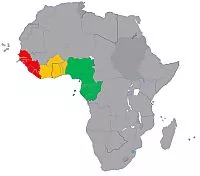Event
After 16 months of intransigence, Central Bank of Nigeria (CBN) Governor Godwin Emefiele announced guidelines for the new policy on Wednesday, 15th June at a press conference in Abuja. A move trailed earlier in the week by Aso Rock Emefiele explained1, "the Central Bank of Nigeria has always maintained that it would continue to monitor situations on the ground and ensure that the Bank's policies reflect these facts and developments rather than the sentiments of any groups or sectors. It is in light of this principle that we now believe that the time is right to restore the automatic adjustment mechanism of the exchange rate with the re-introduction of a flexible inter-bank exchange rate market."
Main Findings
Nigeria has had a fixed exchange rate system since August 2015 and although the naira has been twice devalued to accommodate pressures from falling petrodollars, rigidity rather than flexibility has been the order of the day. Other measures introduced in defence of the USD1:NGN197 peg include limits on overseas spending from local accounts and a forex ban on imports of 41 items. Acute dollar scarcity and a parallel market rate of almost USD1:NGN400 were the result.
Meanwhile, the arguments in favour of foreign exchange controls – protecting those at the bottom from inflation, economic diversification and preventing a collapse in the Naira – have lost their strength. A parallel market has opened up, headline inflation has increased from 9.2% in July 2015 to 15.6% in May 2016 (in the street it feels even worse than these figures imply2), and finally diversification cannot happen in the short term, particularly while essential inputs cannot be obtained. Thus, the economy shrunk for the first time in many years in Q1 2016. That contraction has a human face. Examples include manufacturing companies forced to shut down production lines dramatically since February this year. Real sector troubles have been mirrored in banking sector loan impairment, now job losses (see - http://www.songhaiworldweb.com/need-to-know/update-05-june-2016-nigerian-government-directs-banks-to-halt-layoffs).
Consequently, the central bank finally discarded the peg system and floated the naira this week to widespread relief. Indicative of public opinion, one Nigerian activist tweeted3, "The naira is [now] free to determine its own destiny in a free market. Logic prevails in the end!" Guidelines for the new floating system were unveiled on Wednesday and the system is scheduled to take effect this Monday.
Under the new system, the forex market will operate through a single autonomous interbank window and the exchange rate will be determined by market forces. But the central bank will periodically buy or sell forex to intervene if extreme fluctuations occur. The bank has also decided to introduce primary dealers (chiefly banks) that will deal with the central bank directly for large trade sizes while these primary dealers will in turn deal with other authorized dealers. The central bank is also introducing the sales of futures to try to insulate investors from volatility in the exchange rate.
Outlook
The new forex system is promising but it depends on how the central bank administers it. Meanwhile, not much will likely change for the Nigerian people in the short term other than accessibility – key though this is. Goods are already priced reflecting the current parallel rate (NGN360/USD1), which means the forex taps being turned on that much quicker for credible counterparties as well as a more moderate impact on inflation, ceteris paribus. That said, the expectation is more dollars in the market will accompanied by huge demand e.g. foreign airlines have USD575 million stuck in Nigerian banks4
Footnotes
1 http://www.thisdaylive.com/index.php/2016/06/16/re-introducing-and-operationalizing-nigerias-flexible-exchange-rate-market/
2 Basic needs like food and water are not left out e.g. a water sachet now sells for NGN120 to NGN150 (formerly NGN100); forcing households to cut spending (voluntary austerity).
3 https://twitter.com/Omojuwa/status/743108647945928704?s=09
4 http://www.punchng.com/foreign-airlines-575m-trapped-nigeria-iata/
The content of this article is intended to provide a general guide to the subject matter. Specialist advice should be sought about your specific circumstances.


